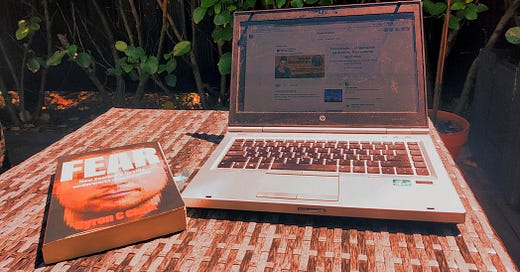An open letter to Substack co-founder Hamish McKenzie
Is this about the "Nazi problem?" you bet it is
Kia ora
I’m aware I’m not the first Substack writer to contact you about the site’s “Nazi problem” (there have been over 200 others) but I feel I can add more to the conversation as a journalist from Aotearoa New Zealand whose work specifically focuses on the far-right and disinformation (my book, ‘Fear: New Zealand’s hostile underworld of extremists’ was published last year, and became a bestseller). I’ve been writing on the Substack platform for about a year. It's been a great way for me to write for my audience and have them support my work, but the growing reputation of Substack as a platform for the far-right is a problem… a big problem.
You were no doubt affected, as everyone from this small country was, by the terror attack that took place in Ōtautahi Christchurch in 2019. Have you read The Royal Commission of Inquiry into the terrorist attack, which noted that the video sharing platform YouTube has been often associated with far-right content and political radicalisation, and that for the terrorist, YouTube was a “far more significant source of information and inspiration” than the fringe far-right websites he visited?
It was just a few months after the atrocity in Christchurch that YouTube began removing thousands of extremist videos. YouTube realised that it should exercise some social responsibility regarding what it gives a platform to. Reddit had years earlier banned explicitly Nazi content, and in 2021 after their own internal research found Facebook was giving white supremacists and conspiracy theorists a way to organise, they stopped algorithmically recommending political groups to users. X (formerly Twitter) has bucked the trend after its takeover by Elon Musk in the name of free speech absolutism. This saw a massive increase in anti-Semitism on the platform and an advertiser exodus that led to a $1.5 billion drop in revenue.
I was disappointed to read your response to the “Substackers against Nazis” letter
“I just want to make it clear that we don’t like Nazis either—we wish no-one held those views. But some people do hold those and other extreme views. Given that, we don't think that censorship (including through demonetizing publications) makes the problem go away—in fact, it makes it worse.”
This isn’t correct, and history has shown this. ‘No Platform for Fascists’ has not always been seen as a radical left-wing position, but the standard policy of all mainstream media outlets. The far-right has utilised the internet since it’s early days to get around the gatekeeping of mainstream media (I’d highly recommend the work of sociologist Jessie Daniels to learn more about this) and in recent years, with social media and recommendation algorithms, they’ve found a new audience. The consequence has been the growth of far-right political parties the world over, and a 320% increase in far-right terror attacks, among them the massacre in Christchurch.
You might believe that deplatforming the far-right will cause them to regroup on other platforms, and you’d be correct – when the social media platforms I’ve mentioned above began cracking down on hateful and violent content, the far-right migrated to ‘alt-tech’ platforms such as Telegram, Parlar, and the explicitly far-right Gab. These platforms are now seen (while some have other uses) as far-right spaces. Perhaps you are familiar with the analogy of the “Nazi bar”, a space in which bigots or extremists have come to dominate due to either a lack of moderation or moderators wishing to remain neutral or avoid conflict. It comes from an anecdote told on Twitter by Michael B. Tager. Tager recounted visiting a "shitty crustpunk bar", where he saw a patron abruptly expelled. The bartender explained that the man was wearing "iron crosses and stuff", and that if not promptly kicked out, that man would come back with other Nazis, which would lead the bartender to realise "oh shit, this is a Nazi bar now" only after the unwanted patrons became too "entrenched" to kick out without trouble.
For many people, Substack is now seen as another Nazi bar. It’s not a space created for Nazis, but it’s a space that welcomes them, and tells them they have as much right to be here as anyone else. I’m seeing many of my favourite writers, such as Talia Lavin, author of ‘Culture Warlords: My Journey into the Dark Web of White Supremacy’ leaving Substack. I’m also seeing my own Substack now become part of a wider boycott of this platform. My followers are wondering why one of Aotearoa’s most prominent critics of the far-right is hanging out in the Nazi bar, and inviting people to start spending their money there – money from which a small percentage of will go toward maintaining a website used (among other things) for spreading hatred.
I’m not leaving this platform – YET, but I can foresee a time when remaining here remains untenable. I don’t think that a platform for hate was the kind of business you set out to build with Substack, and it’s not too late to stop it becoming that. I hope you can come to see that giving an unmoderated platform to the far-right is not just immoral, but a terrible business decision as well.




